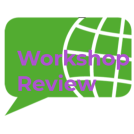 ELTAS Saturday Online Workshop, 13th March, 2021
ELTAS Saturday Online Workshop, 13th March, 2021
Reviewed by Michelle Hunter
Gabriella Kovács inspired us with her enthusiasm for and commitment to a coach-approach to language teaching. Her stated mission: to call attention to a more holistic, person-centred approach which adds dimension to ongoing language learning practices. In our short time together, Gabriella presented her Language Coaching methods, perspectives, tools and tips.
And therein lies the catch: how to get across the hands-off, non-directive nature of coaching in an online event which requires a presenter-focused format? That being said, the aim was not to coach the group, rather to introduce the rationale behind Language Coaching in our context as ELTAS members. In this short review, I will aim to capture the essence of the afternoon’s event such that if you missed it, you can get a flavour of what we learned, and if you were there, you’ll have a summary to refer back to.
True to a coaching approach, Gabriella sounded out her audience by asking us to reflect on our professional journeys so far. She then asked for a future-focused snapshot, noticing many of our responses were framed by the current situation. On the whole, however, our responses fitted to the agenda and the workshop progressed with all on board.
Moving to views on coaching, an interactive whiteboard task elicited one particularly interesting question – “Why is everyone in ELT a coach today?” – which enabled Gabriella to address the most common criticism of coaching in ELT. The argument is that coaching is what experienced, learner-centred teachers do anyway. Gabriella highlighted that, where teaching is often about ‘telling’, coaching is predicated on supporting and helping individuals first and foremost through the process of goal-setting; that active listening and rapport-building are key skills required of a coach. She provided a referenced link to an official definition.
The intersection between pure coaching and language teaching brings us to Language Coaching, a concept which Gabriella and her partner Carrie McKinnon helpfully define on their International Language Coaching (ILCA) website. For quite some time this has proven a difficult concept to clearly pin down within the ELT / ESP communities. The ILCA definition focuses attention on the equally shared responsibility of language coach and learner for the learning process and successful outcomes, “with coachees taking ownership for their own learning and development” (ILCA, 2018).
Gabriella invited the group to interpret a visual analogy of coach, coachee and coaching process. Which did each element in the picture represent?

As can be expected from a group of teachers, there were varying views and perspectives. Near unanimous agreement was reached on the tealeaves representing the different and diverse types of coachees (learners). According to Gabriella’s interpretation, the water is the coach, representing their transparent nature, and the cup is the coaching process – the framework within which the coach and coachee work (brew?) together.
With reference to an Open University whitepaper, Gabriella made the case that we should aim for flexible, self-paced learning: it is the preference of 94% of in-service learners (Overton, 2020). This is, according to ILCA, what Language Coaches provide and Gabriella offered the USAE Model as a framework to help us stay learner-focused and add value to our work. The ensuing activities, tasks and coaching models Gabriella walked us through very much built upon the USAE Model.

We looked at the importance of coaching questions – they should:
- have a time-focus (past, present, or future)
- focus on experiences or goals
- be ‘you’ challenging
- allow for positive or negative
- allow for imaging a scenario
Coaching questions should have a laser-focus, honing in on the intersection between the present and ideal situations. We revisited the GROW Model[1], borrowed from renowned performance coach, Sir John Whitmore (1992):
- G oal
- R eality
- O ptions / opportunities / obstacles
- W ill
Language Coaching has its own set of tools available for use in the class- or training-room:
- the SWOT Analysis matrix helps with goal achievement and obstacle removal by evaluating internal vs. external factors
- scaling is ideal for gauging how someone feels about their progress (i.e.: 1 negative – 10 positive about professional development / progress)
- scaling enables the coachee to consider options for moving further up their scale (i.e.: what needs to happen to move from a 5 to 6 level of satisfaction?)
- working with pictures lends itself to visual learners, and can tap into the emotive side of a topic
- taking a meta-view of traditional course books or material can lift an exercise off the page (e.g.: ask for coachees’ personal view on certain tasks; ask what they think is the intention behind a task)
In closing, Gabriella gave us a peak into recent developments at ILCA around learner benchmarking; she provided us with a set of ‘home resources’ as a personal development follow-up; and she spotlighted what ILCA is offering in 2021 for any of us interested in engaging further in Language Coaching. I can well imagine many people who attended the event will certainly feel encouraged to delve deeper into the ever evolving and growing field of Language Coaching.
References
McKinnon, C. & Kovács, G. (2020). “Supporting Language Teachers on the Language Coaching Journey.” The International Language Coaching Association. www.internationallanguagecoaching.com/who-is-ilca
Overton, L. (2020). Driving business through flexible learning. [White paper]. Open University. http://www.open.ac.uk/business/apprenticeships/blog/driving-business-value-flexible
[1] See also Hunter,M. (2013). A Lesson Plan – GROWing your Business English Learners. IATEFL BESIG Newsletter BI 85. (pp.30-31)

Michelle Hunter, in-company Business English teacher and university adjunct in Germany and the UK, with an MA in Coaching in Education. ELTAS member since 2002, frequent newsletter contributer, ELT event speaker and aspiring PhD.


No Comments Yet